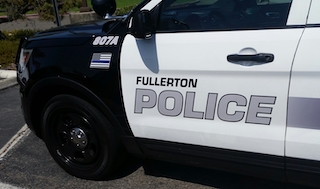In 2013, our client emigrated to the United States from Vietnam as a lawful permanent resident (with a green card). He was 21 years old and came with his parents. The three settled into Fullerton.
Our client got a job working in a warehouse in Santa Ana and before long, he was hooked on methamphetamines. He found other workers at the warehouse used them to stay alert and work harder for overtime hours.
 Fullerton PD Car
Fullerton PD Car
Soon, as is not uncommon, our client began selling meth when he had more than he needed for himself. This supplemented his income at the warehouse.
In late 2015, around Christmas time, he was pulled over by a Fullerton Police Officer after our client ran a red light in Fullerton. At the time, our client was high on meth. Officers searched his car and found about 30 grams of meth, pay-owe sheets, $450 in twenties, tens and fives, plus drug paraphernalia and a stolen credit card.
The client hired a local Vietnamese criminal defense attorney who had about fifteen years’ experience. The attorney charged our client an exorbitant fee and then pressured him into accepting a plea bargain to a violation of Health & Safety Code § 11378, a felony, for sales of a controlled substance (meth). Our client also entered a plea bargain for possession of a controlled substance, Health & Safety Code § 11377, a misdemeanor, as well as possession of drug paraphernalia, Health & Safety Code § 11364, a misdemeanor, and petty theft, Penal Code § 484-488, a misdemeanor.
The local Vietnamese attorney never asked our client if he was a U.S. citizen and never discussed the effects of such convictions on his renewal of his green card. In Vietnamese culture, an attorney is considered beyond reproach and whatever the attorney recommends, one follows. Our client did not dare ask the attorney if the plea bargain was in his best interest.
 Santa Ana Courthouse
Santa Ana Courthouse
The client was not aware there would be any effect because he was a “permanent” resident, so he thought he could not be deported or denied renewal of the green card. Moreover, his primary concern was avoiding any time in jail, which he did with three years of formal probation and sixty days of community service, plus payment of certain fines.
In 2021, however, at age 29, he learned that with such convictions, he would not be able to renew his green card, which was due to expire at the ten-year mark in 2023. He talked to a few immigration attorneys who told him the bad news that his green card would expire and he’d have to return to Vietnam.
One immigration attorney, however, suggested that our client investigate a motion to vacate the conviction based on faulty immigration advice.
The client then called over ten criminal defense attorneys before speaking with Greg Hill. The client told Greg that Greg was the only one who understood the law on this topic under Penal Code § 1473.7 and how “the key to the statute is the mindset of the defendant . . . at the time the plea was taken.” People v. Mejia (2019) 36 Cal. App. 856, 866.
Greg then asked the client questions about what he knew at the time he entered his plea bargain and what he discussed with his attorney at the time.
Greg then explained that the petitioner, our client, needed to show there was a prejudicial error in his conviction by showing he did not meaningfully understand the immigration consequences of his plea and that had he understood such consequences, he would not have entered the plea bargain, but instead would have instructed his attorney to seek an immigration-neutral plea bargain or prepare to go to trial in the case. Our client’s description of his problem he now faces clearly met this standard.
The client then hired Greg Hill & Associates and our office prepared the motion to vacate the plea, explaining that our client’s mindset at the time of the plea bargain was ignorant of the immigration consequence and furthermore, that he was too intimidated by his attorney to ask him questions, which one court, People v Eun Sung Jung, had found constituted prejudicial error, albeit petitioner’s error, sufficient to vacate a conviction.
The motion was served on not only the Orange County District Attorney’s Office, but also our client’s prior attorney.
At the hearing on the motion, the court granted the motion, vacating all four convictions and dismissing the case under Penal Code § 1385. The client was greatly relieved.
For more information about a motion to vacate a conviction under Penal Code § 1473.7, please click on the following articles:
 Fullerton PD Car
Fullerton PD Car Santa Ana Courthouse
Santa Ana Courthouse